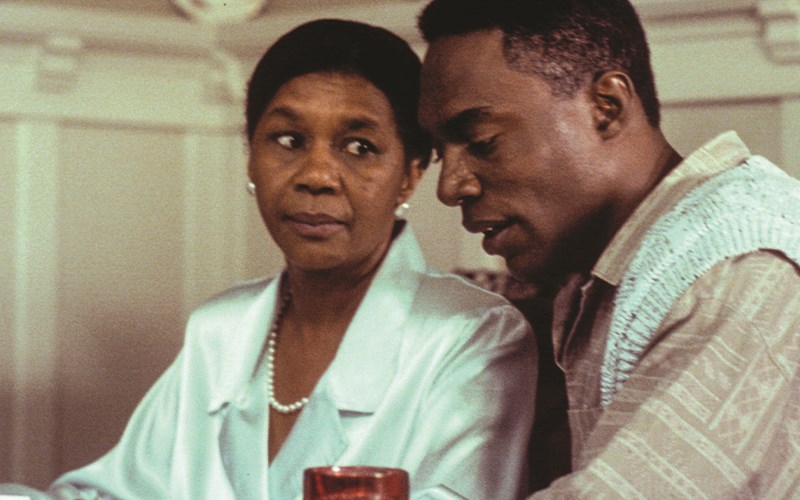
Many films structure their narrative around the power of visitors to disrupt overtly settled lives. Sometimes the results are comic (e.g., The Mating Season), sometimes they are dramatic and heart-warming, (e.g., The Bishop’s Wife) sometimes they are sinister (e.g., The Intruder), and sometimes they are a combination of all these things, as in the superb 1990 film To Sleep With Anger.
The plot: The heads of a multi-generational family, Gideon (Paul Butler) and Suzie (Mary Alice), left The South geographically — but not culturally — decades ago and established themselves in a middle-class Black neighborhood in Los Angeles. Their sons now have families of their own, though Junior (Carl Lumbly) is eminently responsible and “Babe Brother” (Richard Brooks) is immature and selfish. Into this fairly placid picture comes Harry (Danny Glover), a charming acquaintance from back home whom they haven’t seen in 30 years. The trusting, good-hearted Gideon and Suzie invite Harry to stay with them for as long as he wishes. Much like a vampire, once invited over the threshold Harry changes from ingratiating to calculating, undermining the family’s well-being for reasons that remain mysterious.
Writer/Director Charles Burnett put himself on the map with his cinema vérité film school thesis project Killer of Sheep. That film has been lionized by critics as one of the great movies of the 1970s, but its lack of narrative structure or character development limits its appeal outside cineaste circles. In contrast, To Sleep With Anger is a much more accessible movie. Burnett creates an array of full-blooded characters who evolve in believable ways, and a storyline that is dramatically rich. He also proves an assured director in his first film with professional actors.

The heart of the film is Danny Glover, in a darker role than he typically assays (Indeed, other than on some episodes of Hill Street Blues, this is the only time I can recall him getting to develop a malignant character on screen). He is masterful from the very first scene at appearing straightforward, open-hearted, and uncomplicated, while subtly cueing the audience that Harry is none of these things (Burnett’s script is also a help here, giving us some supernatural tipoffs). Some film reviewers have referred to Harry as a “trickster” character but I don’t think that fits. In Black folklore, the trickster uses his wits to triumph over people with more power (e.g., Whites). Harry instead is a danger to the vulnerable and the weak.
Around the mystery of Harry’s motives and nature are more conventional subplots of family drama: The tensions between adults set in their ways and children who want something more modern, the love and rivalry between siblings, and the way marriages can be strong and frail at the same time. With a big assist from Burnett, the entire cast makes these well-worn themes come alive on screen in an authentic and touching way, with some humorous moments as well. In 2019, To Sleep With Anger was selected for inclusion in the Criterion Collection, a deserved honor for this highly original and engaging movie.
